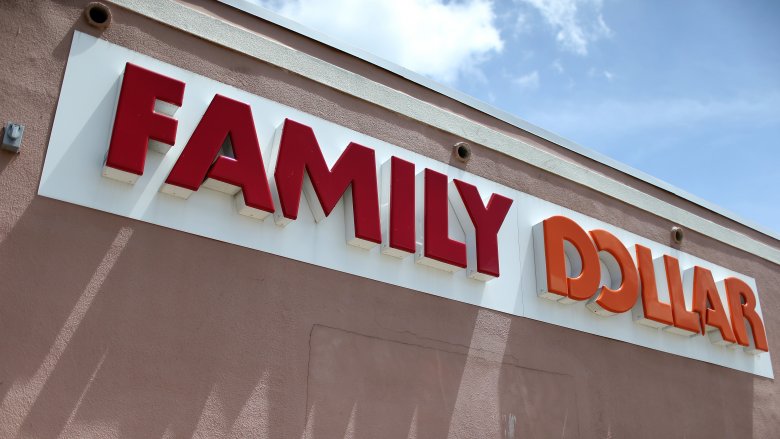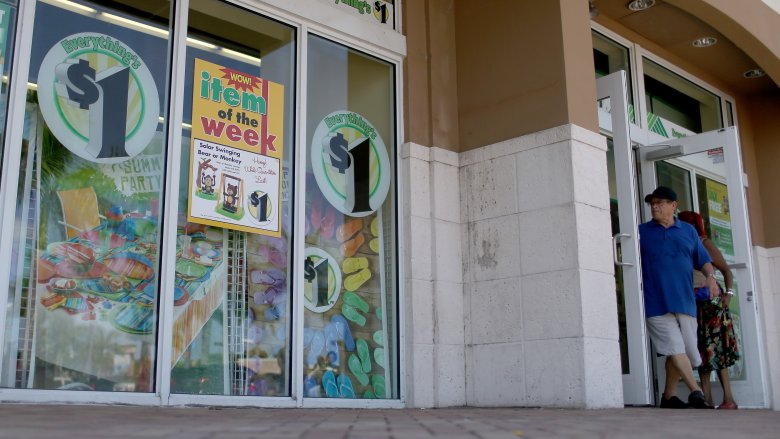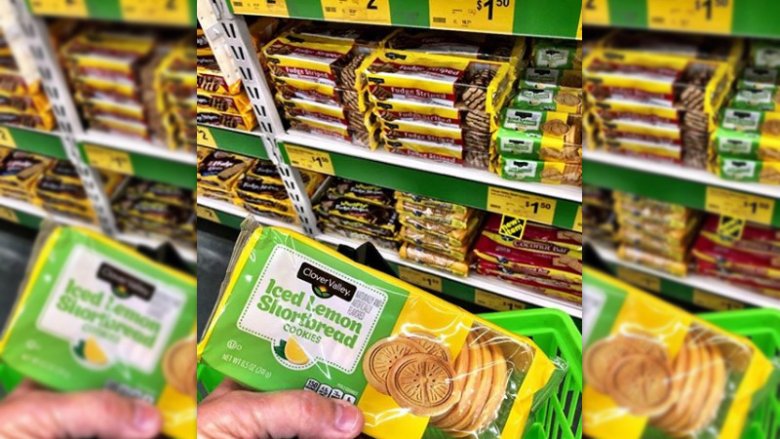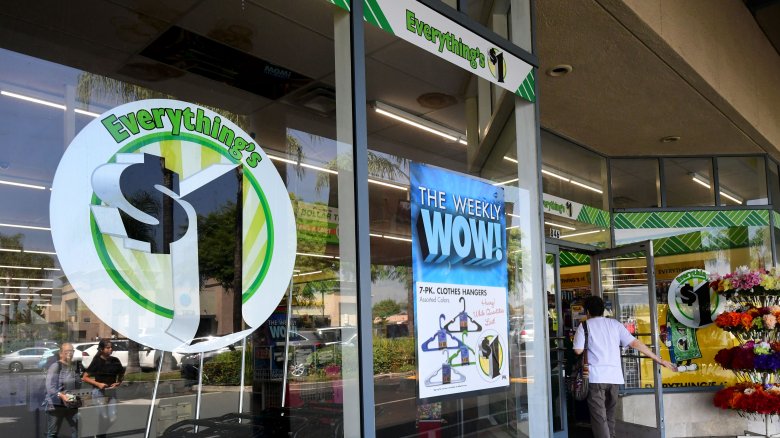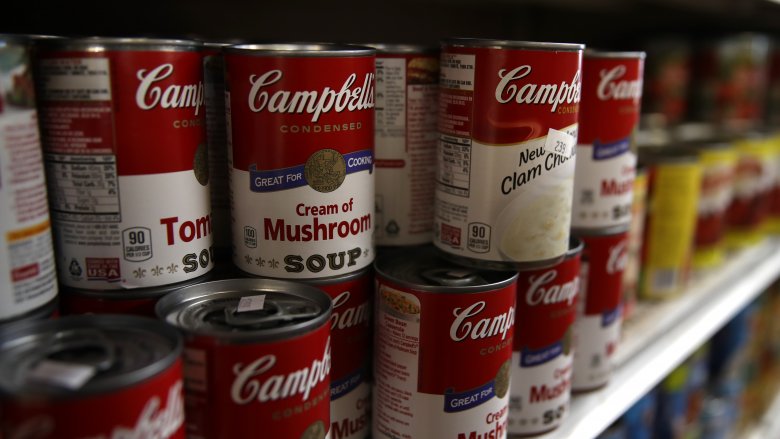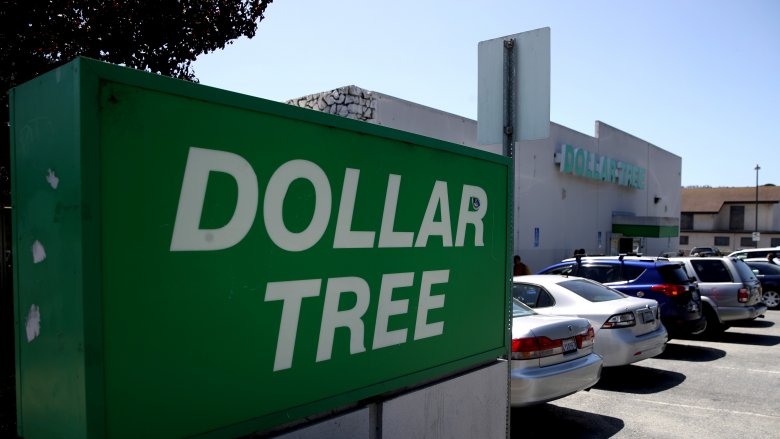The Real Reason Dollar Store Food Is So Cheap
Everybody likes a bargain and in this day and age, it's hard to beat the price of just $1 (or a few dollars, in some cases). Prior to the 2008 recession, dollar stores were around, but they were hardly go-to shopping destinations for the masses. In the decade since, however, dollar stores have skyrocketed in popularity and are becoming a grocery shopping destination. Dollar Tree, Dollar General, or Family Dollar might not be your first choice to go grocery shopping, but again... how can you argue with those bottom-barrel prices?
The big question concerning the food at dollar stores is how they are able to sell it for so cheap and still turn a profit — especially when the cost of everything else these days seems to only be going up.
The answer to that question is a calculated formula that dollar stores have devised, that starts with the physical location and size of their stores and trickles all the way down to what they choose to carry, and how they purchase it.
Dollar stores are often in rural or low-income areas
Location, location, location is the name of the game in business and if a company wants to be in the busy part of town it's going to cost them. However, it's not uncommon to see dollar stores in lower-income sections of a city, or in a totally rural area. "We went where they ain't," a former Dollar General executive said in reference to Walmart. Choosing to operate in areas that Target, Walmart, or Whole Foods wouldn't bother to go has proven highly effective for the growth of dollar stores.
It's why an average of 2.5 stores a day are opening around the United States. Opening and operating in these areas is simply less expensive and this helps keep prices down (via Business Insider). Many dollar stores don't buy the land their stores are on either. Meaning that if they're not doing well, they can just pick up and move. If a Dollar General can keep the lights on and skip out on the pricey property taxes that a Publix is going to pay, it's going to be able to sell its food for much cheaper.
Selling their own brands saves dollar stores money
Yes, you'll find nationally-known brands that you're familiar with in the dollar store, but you're also likely to see a lot of brands that you've never seen in Walmart or other grocery stores. This is because many of the brands on the shelf are the dollar store's own brands. By going the private route, dollar stores are able to have lower margins since they don't have to deal with buying from a major label brand.
Dollar General, for example, can cut back on buying peanuts from Planters and coffee from Folgers by offering these goods under its own Clover Valley label. Dollar General CEO Todd Voss said that the store's own private brands such as its Good & Smart health brand were "an important part of our strategy" in driving sales.
Consumer products expert David Garfield told The Wall Street Journal that these private brands are especially appealing to millennial shoppers who have less brand loyalty. Because they cost dollar stores less money, they're often priced considerably lower than name-brand products.
Plus, according to Fortune, Dollar General sells no more than 10,000 products in its stores. A Walmart might stock ten times that number. By selling a limited selection of popular national brands, dollar stores have a much smaller inventory to keep track of and can maximize their smaller space.
Lower prices often equal smaller sizes at dollar stores
Are you sensing a theme here with dollar stores in regards to keeping things small? Well, that's also going to factor into those super cheap, only-a-buck prices you're getting on food too. If you want a jumbo size bottle of barbecue sauce then hit up Sam's Club, however, if a 10-ounce bottle will do, then your local dollar store has you covered.
Dollar stores like Dollar General may offer not just fewer varieties of a product, but often smaller sizes than what you might normally find at a supermarket. To some, these might seem like "travel size" portions, but the stores are going after only what customers can afford at the moment (via Fortune).
When compared to the size of products that a shopper might find in a grocery store or Walmart, the dollar price doesn't always translate to a good deal. For example, buying a 4.5-ounce box of dollar store raisins for $1 dollar is 52 percent more expensive than buying a 72-ounce box of raisins for $10.50 at a big-box store (via The Guardian). The same often happens to be true for other foods like milk, flour, and chips.
Dollar stores cut special wholesale deals with big brands
Dollar stores might not have the sprawling parking lots and giant stores compared to the big-box stores, but they do have a lot of power. Dollar General and other dollar stores are growing at a rapid rate and because of this, they can often snag really good bulk deals from national brands.
According to Fortune, brands like Coca-Cola and Hershey didn't use to pay much attention to the dollar store segment of the grocery business, but with the massive growth of small-box stores, national brands are now ready to play ball. This means that they'll offer dollar stores those smaller-sized products and as well as higher-quality point-of-sale displays that were once only for higher-end retailers.
"Dollar General have buying power," grocery owner Doug Nech said. "There's not a lot of competition at the wholesale level so it's rather difficult and the smaller you are, you pay a higher price for goods whether it's in delivery costs or volume buying or any number of things."
Because of that buying power, dollar stores can convince brands like Campbell's Soup to make a specially-sized can of chicken noodle that can be bought at a low bulk price, and other stores can't compete.
Cheap doesn't necessarily mean terrible at dollar stores
One might assume that if all the groceries in your basket are $1 each or just a few bucks more, that they're not very good. Well, in some cases, yes the food at a dollar store can be pretty bad. After all, there's a reason why a food review of Dollar Tree's $1 ribeye steak called the meat "rubbery and bland like tougher tofu." Sometimes you just get what you pay for.
However, it's safe to assume that a can of Campbell's chicken noodle soup is going to taste the same whether you buy it at Dollar General or Kroger.
It's apparently even possible to make a solid week's worth of meals from groceries purchased at a dollar store and not find yourself constantly reaching for the Pepto-Bismol. Spoon University writer Amanda Olivero did just that and after spending $35, reported that at the end of the week she "enjoyed every meal" and still felt "healthy and energetic."
While some dollar stores are going to have a better food selection than others, Dollar General did announce plans to expand its fresh produce availability to 450 of its stores in 2019.
